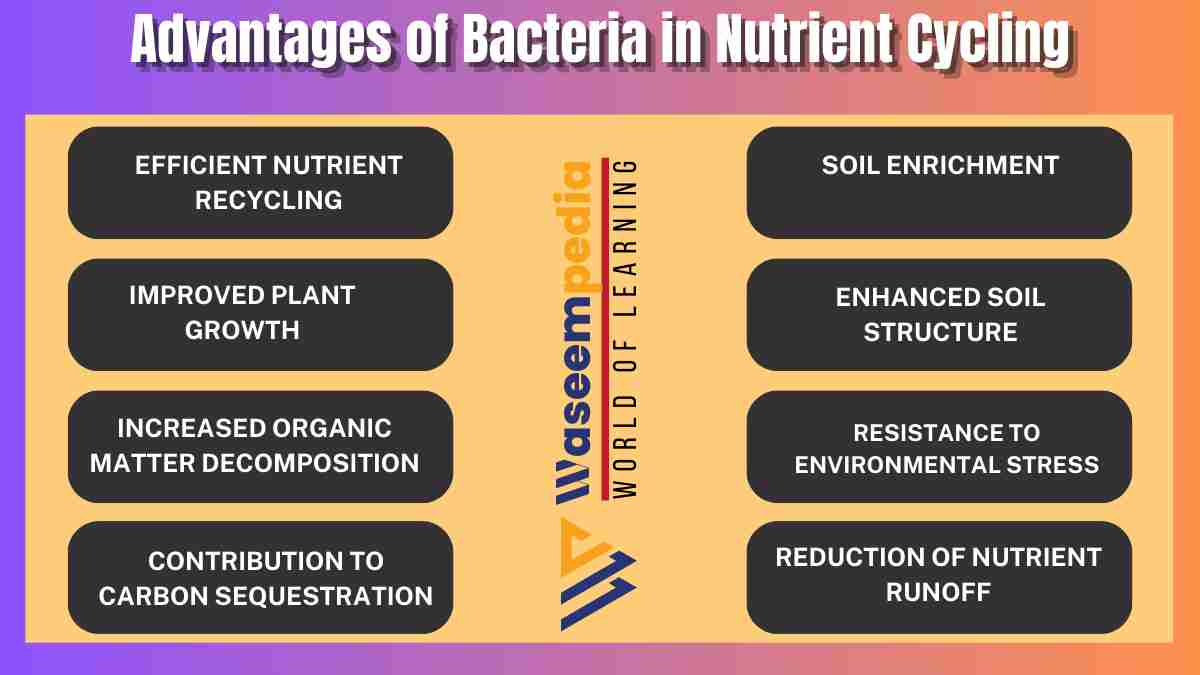Nutrient cycling is a vital process that ensures the availability and recycling of essential elements in ecosystems. Bacteria play a crucial role in this process by facilitating the decomposition of organic matter and the release of nutrients back into the environment.
Bacteria play a critical role in nutrient cycling, ensuring the availability of essential elements for the growth and development of organisms in ecosystems.
Through decomposition, nitrogen fixation, phosphorus solubilization, carbon cycling, symbiotic relationships, and soil fertility enhancement, bacteria contribute to the efficient recycling of nutrients, promoting ecosystem sustainability and resilience.
In this article, we will read the advantages of bacteria in nutrient cycling and shed light on their significant contributions.
Introduction of Bacteria in Nutrient Cycling
Nutrients are essential for the growth and survival of all living organisms. Nutrient cycling refers to the process by which nutrients are recycled and made available for reuse in the environment. Bacteria, with their diverse metabolic capabilities, play a key role in nutrient cycling, ensuring the availability of essential elements for plants, animals, and other organisms.
Understanding Nutrient Cycling
Nutrient cycling involves the movement and transformation of elements such as carbon, nitrogen, phosphorus, and others through various biogeochemical processes. Bacteria contribute to nutrient cycling through their ability to break down organic matter, convert atmospheric nitrogen into a usable form, solubilize phosphorus, and participate in other crucial metabolic activities.
6 Advantages of Bacteria in Nutrient Cycling
6 Advantages of Bacteria in Nutrient Cycling are as following.
1. Bacteria’s Role in Decomposition
Decomposition is a fundamental process in nutrient cycling. When plants and animals die, bacteria initiate the breakdown of organic matter, releasing carbon, nitrogen, phosphorus, and other elements trapped within it. Bacteria secrete enzymes that break down complex organic compounds into simpler forms, making them available for uptake by other organisms.
2. Nitrogen Fixation
Nitrogen is an essential nutrient for all living organisms, but it exists predominantly in the atmosphere as an inert gas. Certain bacteria, known as nitrogen-fixing bacteria, have the unique ability to convert atmospheric nitrogen into a biologically available form called ammonia. This process, called nitrogen fixation, is crucial for maintaining nitrogen levels in ecosystems and is especially important for plant growth.
3. Phosphorus Solubilization
Phosphorus is another vital nutrient required for plant growth, but it is often present in forms that are not readily available to plants. Certain bacteria have the capability to solubilize insoluble forms of phosphorus, making it accessible to plants. By releasing organic acids and enzymes, these bacteria break down phosphate compounds and convert them into forms that plants can absorb and utilize.
4. Carbon Cycling
Carbon is a key element in all living organisms, and its cycling is essential for maintaining ecosystem balance. Bacteria play a significant role in carbon cycling through processes such as respiration, fermentation, and decomposition. They break down complex carbon compounds and release carbon dioxide back into the atmosphere or convert it into organic matter that can be utilized by other organisms.
5. Symbiotic Relationships
Bacteria form symbiotic relationships with plants and animals, further enhancing nutrient cycling. For example, certain bacteria establish symbiotic associations with leguminous plants, forming nodules on the plant roots. These bacteria, called rhizobia, can fix atmospheric nitrogen and provide it to the host plant, thereby contributing to the plant’s nutrient requirements.
6. Soil Fertility Enhancement
Bacteria contribute to soil fertility by improving its nutrient content and structure. As bacteria decompose organic matter, they release essential nutrients, including nitrogen, phosphorus, and potassium, into the soil. Additionally, bacteria help in soil aggregation and nutrient retention, making the soil more fertile and conducive to plant growth.

